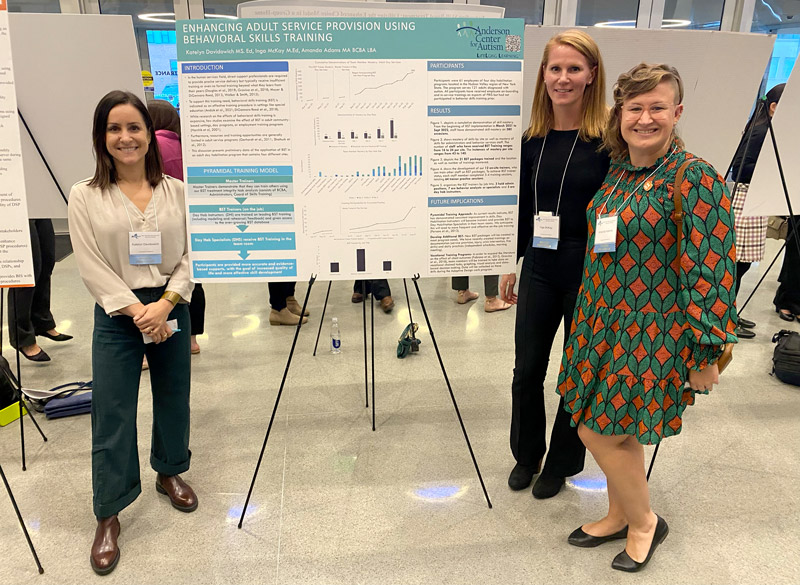Countless ‘students of autism’ work tirelessly every day, all over the world, to learn everything possible about the neurological disorder. They read voraciously, observe closely, and listen deeply. In many cases, their thirst for knowledge is so insatiable and their passion for the cause so strong that they feel inclined to pursue advanced degrees and/or delve into research.

And – on the heels of news that incidence rates have jumped to 1 in 36 (Centers for Disease Control), it is crucial that anyone who feels inspired to conduct research has the opportunity to do so.
Like anything in life, however, just getting to the starting line of a research project can be a challenge.
Noted Gina Feliciano, PhD, SAS, BCBA-D, LBA, Chief Program Officer at Anderson Center for Autism, “To present at a conference or publish any research that has been done, an Institutional Review Board (IRB) must review the proposal prior to research even getting underway. Much of the time, a university can review a project for its safety – and when the research is complete, with that stamp of approval from the university, a scholar can present, publish, and promote progress.”
Unfortunately, she added – without a university affiliation, proposed research projects often end up in a digital abyss – emailed to someone for consideration who will forever leave that message (and, thus, doors to potentially game-changing knowledge) unopened. Or, the request is flat-out declined – simply because the researcher has no connection to that university.
An independent IRB, however, offers a solution to this problem.
Said Feliciano: “But finding an independent IRB has long been difficult – and that is an understatement. The lack of access to independent IRBs over the years has been a real disservice to both the ‘students of autism’ and those who are diagnosed (as well as their loved ones).”
She continued, “I wanted to find a way to help resolve this issue, at least in part. Working for an agency that has been in the field for nearly 100 years (Anderson Center for Autism), I knew we could harness the power of our expert team to launch our first-ever Institutional Review Board. I approached colleagues on our leadership team to ask if they could get on board with the idea, and got a resounding ‘yes’ to my request.”
Led by Feliciano, the group got organized and are now ready to accept submissions. Anderson Center for Autism’s new IRB, who will meet on a rolling basis, is composed of scientists such as behavior analysts and special educators, and non-scientists, who represent areas such as finance and adult residential services; there is also a participating member who identifies as neurodiverse. All have completed mandatory training through CITI (The Collaborative Institutional Training Initiative).
“And we’re now accepting proposals! If you’re looking for us to review your idea, here is what you’ll need to know: each research proposal will need to be complete with an abstract, literary citations, consent forms, procedures/plans, and methodologies before it can be reviewed by Anderson’s IRB. A quorum (5 people) will be required to make any decisions about whether the proposal is deemed to be one with ‘no risk, minimum risk, or risk – and one in which the benefits outweigh any risk.’ Once we have determined its approval (or disapproval), we will communicate that to the researcher,” explained Feliciano.
“We expect that most of the proposals we receive at Anderson will have to do with training, so I don’t believe we’ll get many requests that would pose any danger or risk. We look forward to assessing each and every one. I anticipate that we will see many research proposals which can lead to changes in instructional methodologies, staff training topics, and capacity-building of agencies. It’s exciting; we all know that research leads to higher-quality service delivery across the board, and every person out there who puts their time and energy into conducting research will help our entire field make strides.”
The launch of Anderson Center for Autism’s Institutional Review Board represents an investment into the field and into fellow ‘students of autism.’ Professionals, graduate students, scholars, field experts, other agencies, and colleagues internal and external to the organization can put together a research proposal, and if approved to move forward, can engage in the critically important and forward-thinking research that will help lead to the implementation of evidence-based practices and/or refine those approaches that exist today.
“Indeed, it is a win for everyone – especially for autistic and neurodivergent individuals who will benefit from the resulting intellectual development and insights,” said Feliciano.
She noted that this helps to further Anderson Center for Autism’s mission, which is to optimize the quality of life for individuals with autism.
“By remaining ‘students of autism’ ourselves, and supporting all who want to learn, grow, and discover, we can continue to bring that mission to life, in all corners of the globe,” reflected Feliciano.
To learn more about submitting a research proposal to Anderson Center for Autism’s Institutional Review Board (IRB), call Anderson Center for Autism’s Chief Program Officer and IRB Chair, Gina Feliciano, Phd, SAS, BCBA-D,LBA, at 845.889.9047 or email gfelicianophd@andersoncares.org.
Anderson Center for Autism, originally established nearly a century ago in 1924, has long been providing educational, vocational, and residential services for people with autism. Its award-winning programs are rooted in the principles of Applied Behavior Analysis and evidence-based practices, drawing students and residents from all over the United States to experience its school and residential offerings. In addition, Anderson Center International (ACI) has for many years hosted scholars from countries throughout the world for a 12-18 month training program at Anderson’s Staatsburg campus; during that period, scholars gain the education needed to improve schooling, workplace environments, and overall therapy and care for people with autism upon returning to their home countries.
Another well-known aspect of the organization is Anderson Center Consulting and Training (ACCT), which ensures that individuals, leaders, municipalities, schools, businesses, and entire communities have the training needed to gain designation as being “Autism Supportive.” The agency also recently opened two Anderson Early Learning Academy locations, in Pine Plains and Latham, NY, and The Anderson Center Clinic in Latham.
Marybeth Cale is the owner of Cale Communications and Estuary Coaching. She lives in the Hudson Valley region of New York State, and serves as Secretary of the Board of Trustees for Anderson Foundation for Autism. Learn more about her services and expertise at calecommunications.com or estuarycoaching.com.





